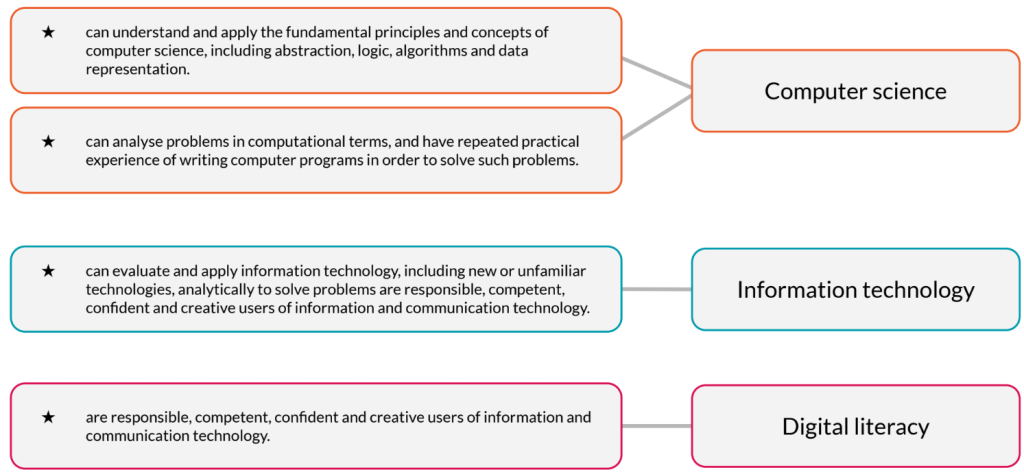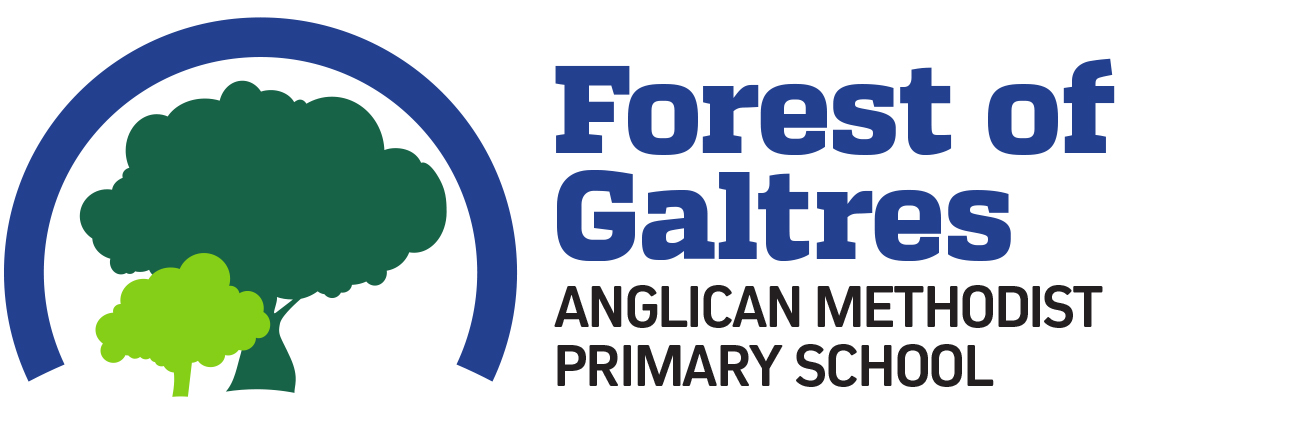Computing
‘Whether you want to uncover the secrets of the universe, or you want to pursue a career in the 21st century, basic computer programming is an essential skill to learn.’ – Stephen Hawking
Our computing curriculum at Forest of Galtres Anglican Methodist School is underpinned by our school vision of being Rooted and Grounded in Love for All (Ephesians 3.17). We live this out through our values of care, collaboration, creativity, courage and Christian faith.
Intent
At Forest of Galtres Anglican Methodist Primary School, we intend that children should master Computing to such an extent that they can fully participate in the digital world of the 21st century, without being completely reliant on technology. We have 5 categories threaded throughout the Computing curriculum which is progressive from EYFS to Year 6.

Our children will be repeatedly exposed to the online literacy skills they need for their future, but in increasingly complex contexts or with increasingly complex tasks.
Our children will be taught how to use technology responsibly and safely, being mindful of how their behaviour, actions and words can affect others. Our children will be taught Computing in a way that ensures progression of skills and follows a sequence to build on previous knowledge. They will gain experience and skills in a wide range of technology in a way that will enhance their learning opportunities, enabling them to use technology across a range of subjects to be creative and solve problems, ensuring they make progress.
We have designed our curriculum, which is underpinned by Kapow and the national curriculum. We have identified these three strands which run throughout our scheme of work:

By following these strands and carefully planned units, our children will be confident users of technology and have the relevant technical skills to guide them into their future.
Impact
From our curriculum, children will be able to:
- Be critical thinkers and able to understand how to make informed and appropriate digital choices in the future.
- Understand the importance that computing will have going forward in both their educational and working life and in their social and personal futures.
- Understand how to balance time spent on technology and time spent away from it in a healthy and appropriate manner.
- Understand that technology helps to showcase their ideas and creativity.
- They will know that different types of software and hardware can help them achieve a broad variety of artistic and practical aims.
- Show a clear progression of technical skills across all areas of the National curriculum – computer science, information technology and digital literacy.
- Be able to use technology both individually and as part of a collaborative team.
- Be aware of online safety issues and protocols and be able to deal with any problems in a responsible and appropriate manner.
- Have an awareness of developments in technology and have an idea of how current technologies work and relate to one another.
- Meet the end of key stage expectations outlined in the National curriculum for Computing.
The FOG Learning Cycle ensures children know more and remember more – pupils get better at Computing over time. It focuses on recall of prior knowledge, (connect), the teaching of new knowledge and skills (I do), modelling and scaffolding (we do) and independent, inquiry based learning (you do). Alongside this, we have a spiral curriculum which builds on the children’s knowledge year on year:
- Cyclical: Pupils revisit the five key areas throughout KS1 and KS2.
- Increasing depth: Each time a key area is revisited, it is covered with greater complexity.
- Prior knowledge: Upon returning to each key area, prior knowledge is utilised so pupils can build on previous foundations, rather than starting again.
Finding the right balance with technology is key to an effective education and a healthy life-style. We feel the way we implement computing helps children realise the need for the right balance and one they can continue to build on in their next stage of education and beyond. We encourage regular discussions between staff and pupils to best embed and understand this. The way pupils showcase, share, celebrate and publish their work will best show the impact of our curriculum. We also look for evidence through reviewing pupil’s knowledge and skills digitally through tools like Google Drive and Google Classroom.
Online safety
Online safety is at the heart of our computing and PSHE curriculum.
Our online safety curriculum is underpinned by Education for a Connected World. It enables the development of teaching and learning as well as guidance to support children and young people to live knowledgeably, responsibly and safely in a digital world. It focuses specifically on eight different aspects of online education:
- Self-image and Identity
- Online relationships
- Online reputation
- Online bullying
- Managing online information
- Health, wellbeing and lifestyle
- Privacy and security
- Copyright and ownership
We support and broaden the provision of online safety education, so that it is empowering, builds resilience and effects positive culture change. The objectives promote the development of safe and appropriate long term behaviours, and support educators in shaping the culture within their setting and beyond.
Computing outside the curriculum:
- Coding club
- Reading Plus
- Times Table rockstars
- Using technology to research
- Typing/publishing work
Click for: Computing Implementation
Click for: Education for a connect world
Click for: Computing – National Curriculum



